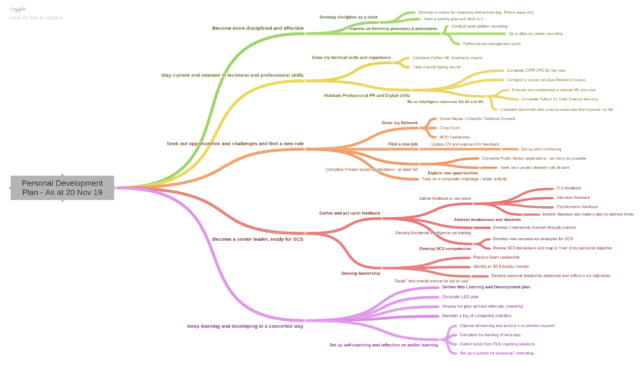What it was:
An activity to develop and share my personal learning and development plan.
What I learned:
I wanted to use this as an exercise in planning and discipline, so I adopted the “Goals > Objectives > Tasks” approach to make a logical, structured list
I used these sources:
https://governancemanagement.webauthor.com/develop-goals-objectives-and-tasks
http://thoughtfullearning.com/inquireHSbook/pg356
Finally I used a text editor to write it and then Coggle to visualise it. There a few errors in the conversion, some of which I have fixed by hand, but the end result is close enough!
Here is the result, with the link to the full plan and a plain-text version pasted in for reference:

Personal Development Plan – As at 20 Nov 19
Become more disciplined and effective
Develop discipline as a habit
Develop a routine for removing distractions (eg Phone away etc)
Have a weekly plan and stick to it
Improve on following processes & procedures
Up to date on Leave recording
Performance management cycle
Conduct work pattern recording
Stay current and relevant in technical and professional skills
Grow my techical skills and experience
Complete Python ML Bootcamp course
Take a touch typing course
Maintain Professional PR and Digital skills
Complete CIPR CPD for the year
Compete a course on User Research basics
Be an intelligent customer for AI and ML
Complete real-world data science exercises that improve my life
Complete Python for Data Science learning
Execute and understand a sample ML exercise
Seek out opportunities and challenges and find a new role
Grow my Network
Social Media / LinkedIn / Defence Connect
Cross Govt
MOD Leadership
Find a new job
Update CV and expose it for feedback
Set up jobs monitoring
Complete Private sector applications – at least 50
Complete Public Sector applications – as many as possible
Explore new opportunities
Seek out a project delivery role at work
Take on a corporate challenge / wider activity
Become a senior leader, ready for SCS
Gather and act upon feedback
Gather feedback in one place
FLS feedback
Interview feedback
Psychometric feedback
Address weaknesses and shadows
Identify shadows and make a plan to address them
Develop Emotional Intelligence via training
Develop Commercial Acumen through practice
Develop SCS competences
Develop new competence examples for SCS
Review SCS behaviours and map to ‘how’ of my personal objective
Develop leadership
Practice Open Leadership
Identify an SCS buddy / mentor
Read: “why should anyone be led by you”
Develop personal leadership statement and reflect in my objectives
Keep learning and developing in a concerted way
Deliver this Learning and Development plan
Generate L&D plan
Review the plan at fixed intervals (monthly)
Maintain a log of completed activities
Set up self-coaching and reflection on earlier learning
Capture all learning and actions in a coherent system
Complete the backlog of write-ups
Collect notes from FLS coaching sessions
Set up a system for reviewing / reminding
What I will aim to do differently as a result:
The plan lists all the things I want to do as part of my learning. There’s a lot there so the challenge will be to stick to it and be realistic about how much of this is doable inside one year.
I’ll likely create a Trello board to track my learning actions – but that is for later.